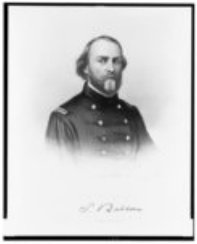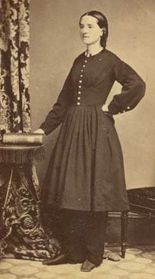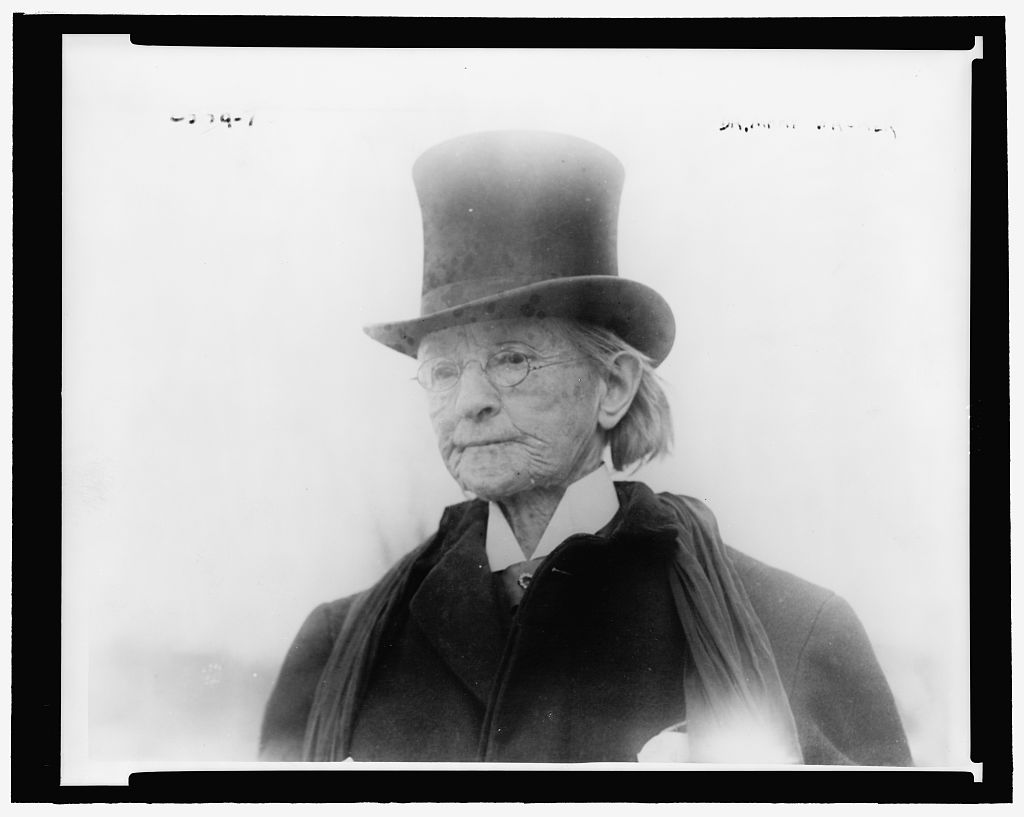By the time the Civil War broke out, Walker had already experienced the ups and downs of life. She graduated from Syracuse Medical School in Syracuse, New York in 1855. She had married, set up a private practice, closed that same private practice, and divorced her husband. She had embraced the idea of dress reform, raising eyebrows and eliciting whispers because of her decision to avoid the constricting, uncomfortable and unhealthy clothing women were expected to wear—long skirts, petticoats, and corsets—instead dressing in men’s pants and suspenders worn under short dresses. As the country mobilized after President Lincoln’s call for 75,000 volunteers to suppress the Confederate rebellion, Dr. Walker tried to join the army, but much like society at large, the United States Army was skeptical of the skills of a female surgeon. Instead, Mary volunteered her time as a nurse, bandaging wounds, comforting the sick and wounded, writing letters for soldiers who couldn’t do so themselves. Near Washington, D.C. as the first battle of the Civil War got underway just miles outside of town near Bull Run Creek, she worked in a field hospital caring for the battle’s Union wounded. She later worked at the Patent Office Hospital, served as an unpaid field surgeon after the Union defeat at Fredericksburg and in Chattanooga after the Union defeat at Chickamauga. Though the Army wouldn’t enlist her, they finally began to employ her as a contracted (civilian) Assistant Surgeon for the Army of the Cumberland. She would later be appointed Assistant Surgeon of the 52nd Ohio Infantry Regiment. On April 10, 1864, she had just finished assisting a Confederate surgeon with an amputation, when Confederate troops captured her in neutral territory and accused her of spying. Dr. Walker was transported to Castle Thunder, a prisoner of war camp in Richmond, Virginia, where she spent the next four months. Her dress, which allowed her the freedom of movement necessary to perform her duties as an army surgeon, was especially conspicuous in Castle Thunder and brought ridicule in the Richmond newspapers, including the Richmond Sentinel, which reported in its April 22, 1864 edition, “Female Yankee Surgeon--The female Yankee surgeon captured by our pickets a short time since, in the neighborhood of the army of Tennessee, was received in this city yesterday evening, and sent to the Castle in charge of a detective. Her appearance on the street in full male costume, with the exception of a gipsey hat, created quite an excitement amongst the idle negroes and boys who followed and surrounded her. She gave her name as Dr. Mary E. Walker, and declared that she had been captured on neutral ground. She was dressed in black pants and black or dark talma or paletot. She was consigned to the female ward of Castle Thunder, there being no accommodations at the Libby for prisoners of her sex. We must not omit to add that she is ugly and skinny, and apparently above thirty years of age.” She was finally exchanged, surgeon for surgeon, on August 12, 1864. She returned to her service and was given charge of female prisoners in a Kentucky prison and later a Tennessee orphanage. After the war, Generals William Tecumseh Sherman and George Thomas recommended Dr. Walker for the Medal of Honor and on November 11, 1865, President Andrew Johnson signed the order awarding her the Army’s highest honor even though she had served as a civilian. Whereas it appears from official reports that Dr. Mary E. Walker, a graduate of medicine, "has rendered valuable service to the Government, and her efforts have been earnest and untiring in a variety of ways," and that she was assigned to duty and served as an assistant surgeon in charge of female prisoners at Louisville, Ky., upon the recommendation of Major-Generals Sherman and Thomas, and faithfully served as contract surgeon in the service of the United States, and has devoted herself with much patriotic zeal to the sick and wounded soldiers, both in the field and hospitals, to the detriment of her own health, and has also endured hardships as a prisoner of war four months in a Southern prison while acting as contract surgeon; and Whereas by reason of her not being a commissioned officer in the military service, a brevet or honorary rank cannot, under existing laws, be conferred upon her; and Whereas in the opinion of the President an honorable recognition of her services and sufferings should be made. It is ordered, That a testimonial thereof shall be hereby made and given to the said Dr. Mary E. Walker, and that the usual medal of honor for meritorious services be given her.
0 Comments
 Sullivan Ballou Engraved by J.A. O'Neill Library of Congress Sullivan Ballou Engraved by J.A. O'Neill Library of Congress Anyone who has watched the Ken Burns documentary, The Civil War, knows the heartbreaking words written by Rhode Island Major Sullivan Ballou to his wife Sara. The letter, written from his Union Army encampment in Washington D.C. just one week before the first major land battle of the Civil War (Bull Run) is evocative as both a love letter and a statement of purpose. The letter gives us insight into the motives driving the early volunteers called to arms by President Lincoln’s request for 75,000 troops to put down the rebellion in the Cotton 7 states. It also gives us insight into a very human relationship between a man and his wife and children. Headquarters, Camp Clark Washington, D.C., July 14, 1861 My Very Dear Wife: Indications are very strong that we shall move in a few days, perhaps to-morrow. Lest I should not be able to write you again, I feel impelled to write a few lines, that may fall under your eye when I shall be no more. Our movement may be one of a few days duration and full of pleasure and it may be one of severe conflict and death to me. Not my will, but thine, O God be done. If it is necessary that I should fall on the battle-field for any country, I am ready. I have no misgivings about, or lack of confidence in, the cause in which I am engaged, and my courage does not halt or falter. I know how strongly American civilization now leans upon the triumph of government, and how great a debt we owe to those who went before us through the blood and suffering of the Revolution, and I am willing, perfectly willing to lay down all my joys in this life to help maintain this government, and to pay that debt. But, my dear wife, when I know, that with my own joys, I lay down nearly all of yours, and replace them in this life with care and sorrows, when, after having eaten for long years the bitter fruit of orphanage myself, I must offer it, as their only sustenance, to my dear little children, is it weak or dishonorable, while the banner of my purpose floats calmly and proudly in the breeze, that my unbounded love for you, my darling wife and children, should struggle in fierce, though useless, contest with my love of country. I cannot describe to you my feelings on this calm summer night, when two thousand men are sleeping around me, many of them enjoying the last, perhaps, before that of death, and I, suspicious that Death is creeping behind me with his fatal dart, am communing with God, my country and thee. I have sought most closely and diligently, and often in my breast, for a wrong motive in this hazarding the happiness of those I loved, and I could not find one. A pure love of my country, and of the principles I have often advocated before the people, and "the name of honor, that I love more than I fear death," have called upon me, and I have obeyed. Sarah, my love for you is deathless. It seems to bind me with mighty cables, that nothing but Omnipotence can break; and yet, my love of country comes over me like a strong wind, and bears me irresistibly on with all those chains, to the battlefield. The memories of all the blissful moments I have spent with you come crowding over me, and I feel most deeply grateful to God and you, that I have enjoyed them so long. And how hard it is for me to give them up, and burn to ashes the hopes of future years, when, God willing, we might still have lived and loved together, and seen our boys grow up to honorable manhood around us. I know I have but few claims upon Divine Providence, but something whispers to me, perhaps it is the wafted prayer of my little Edgar, that I shall return to my loved ones unharmed. If I do not, my dear Sarah, never forget how much I love you, nor that, when my last breath escapes me on the battle-field, it will whisper your name. Forgive my many faults, and the many pains I have caused you. How thoughtless, how foolish I have oftentimes been! How gladly would I wash out with my tears, every little spot upon your happiness, and struggle with all the misfortune of this world, to shield you and my children from harm. But I cannot, I must watch you from the spirit land and hover near you, while you buffet the storms with your precious little freight, and wait with sad patience till we meet to part no more. But, O Sarah, if the dead can come back to this earth, and flit unseen around those they loved, I shall always be near you in the garish day, and the darkest night amidst your happiest scenes and gloomiest hours always, always, and, if the soft breeze fans your cheek, it shall be my breath; or the cool air cools your throbbing temples, it shall be my spirit passing by. Sarah, do not mourn me dear; think I am gone, and wait for me, for we shall meet again. As for my little boys, they will grow as I have done, and never know a father's love and care. Little Willie is too young to remember me long, and my blue-eyed Edgar will keep my frolics with him among the dimmest memories of his childhood. Sarah, I have unlimited confidence in your maternal care, and your development of their characters. Tell my two mothers, I call God's blessing upon them. O Sarah, I wait for you there! Come to me, and lead thither my children. - Sullivan Discussion Questions 1. Have you ever received a letter? Why kinds of emotions does it evoke? Do other forms of communication evoke those same emotions or different ones? 2. What does Sullivan say is his motivation for leaving his family and fighting for the Union? 3. Imagine you were living in Rhode Island in 1861 and were undecided about whether to join the fight. If Sara shared her husband’s letter with you, would it convince you to join the army? Would it convince you to stay home? 4. Would this letter be necessarily different if this were written by a volunteer from South Carolina? How would you expect it to differ? How would you expect it would be the same? |
AuthorToni is a wife, mom and history buff who loves bringing the Civil War to life for family members of all ages. Archives
July 2018
Categories
All
|


 RSS Feed
RSS Feed